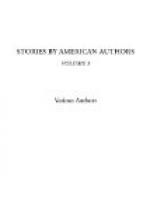“Consul? Is your husband, then, in the Consular service of Spain?” queried the doctor, somewhat surprised.
“He is here as Consul to Charleston—in—ah, what is the name?—Carolina.”
“Can you prove that?” demanded the physician, somewhat excitedly.
“I can—that is, I think there are official papers in the trunks. Is it necessary?”
“Very necessary.”
“Here are the keys, then.”
The doctor in her presence opened the luggage, and in a curiously arranged secret compartment in one of the trunks found the documents. After a few moments spent in looking them over, he said:
“Do you feel strong to-day?”
“Not very.”
“I think you could travel, however. I will see that your baggage is properly packed, if you will be prepared to accompany me to-morrow morning.”
“But whither?”
“To Washington; to the Spanish Minister. This is a serious business.”
Under the supervision of the doctor the journey was safely accomplished. After proper repose Senora Blanco and the physician proceeded to the Spanish Legation, and within a very short time Senor Antonio Mantilla, Minister Plenipotentiary and Envoy Extraordinary of His Catholic Majesty, was in possession of Blanco’s papers, and of the facts, so far as known to his visitors, attending that gentleman’s arrest.
Senor Mantilla looked grave and said little. He thanked the physician, however, warmly for the part he had taken in the matter, and calling a secretary placed Senora Blanco in his charge, with instructions that she should receive the greatest care and attention.
He then desired the attendance of his Secretary of Legation, and the two officials remained in earnest consultation for more than two hours. During this period several telegrams were sent to the Spanish Consul at New Orleans, and a long cipher-message to the Minister of Foreign Affairs in Madrid.
A few days later a lengthy report was received from the Consul at New Orleans, accompanied by three letters from Blanco to his wife, not one of which had been forwarded from the jail in which he was confined.
Another consultation was held at the Spanish Legation, during which this report and an answering message from Madrid were frequently referred to.
The report set forth the facts of the identification of Blanco as Sangrado by the Chilian representatives, with sufficient certainty to convince the U.S. Commissioner. Until a late period in the inquiry Blanco had had no counsel. He had, however, asseverated from the beginning that he was the Consul of Spain at Charleston—a fact not believed, because there was already a Consul resident at that place. Communication with that official simply showed that he expected to be transferred to another post, but had not been informed of the name of his successor. The Commissioner, seeing that Blanco was doing nothing to obtain testimony in his own favor, quietly arranged that counsel should be provided for him; and the lawyers, as a matter of course, at once sent to New York for Blanco’s papers.




